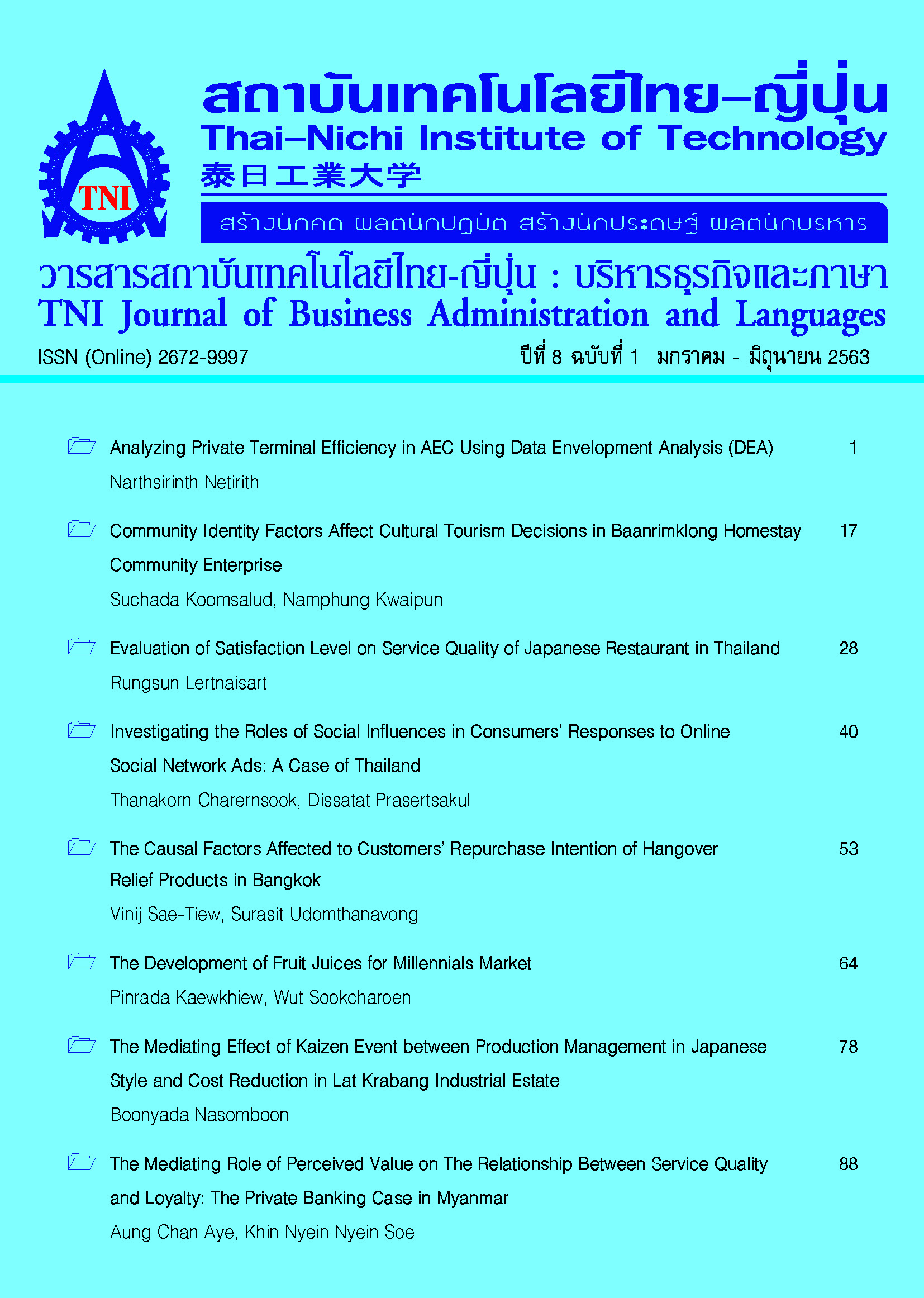Evaluation of Satisfaction Level on Service Quality of Japanese Restaurant in Thailand
Main Article Content
Abstract
This study aims to investigate the behavior of Thai customer and evaluate satisfaction level on service quality of Japanese restaurant in Thailand. RATER (Reliability, Assurance, Tangibles, Empathy, Responsiveness) model is used to evaluate service quality by applied to service marketing factors, 3P: people, process and physical evidence, in order to improve quality of restaurant in Thailand and also to build model of quality improvement of other type of restaurant in Thailand.
The data collecting method is using questionnaire, and 478 research samples were collected from consumers from shopping center and Japanese restaurant street in Bangkok. Data analysis used in this study are mean, standard deviation, t-test and F-test by using standard analytical program.
The results of the study are 1. Customers classified by income. All groups are satisfied with people, process and physical evidence in high level. 2. Customers who have experience to Japan are satisfied with people, process and physical evidence in high level, but who have no experience are satisfied with people and physical evidence in high level, with process in medium level. 3. Customers classified by frequency of using service are satisfied with people, process and physical evidence in high level. 4. Customers classified by expense of using service are satisfied with people, process and physical evidence in high level. But from comment of Focus Group, it is found that service quality of people, process and physical evidence of Japanese restaurant in Thailand cannot be compared to those in Japan which have very high quality.
Article Details
Article Accepting Policy
The editorial board of Thai-Nichi Institute of Technology is pleased to receive articles from lecturers and experts in the fields of business administration, languages, engineering and technology written in Thai or English. The academic work submitted for publication must not be published in any other publication before and must not be under consideration of other journal submissions. Therefore, those interested in participating in the dissemination of work and knowledge can submit their article to the editorial board for further submission to the screening committee to consider publishing in the journal. The articles that can be published include solely research articles. Interested persons can prepare their articles by reviewing recommendations for article authors.
Copyright infringement is solely the responsibility of the author(s) of the article. Articles that have been published must be screened and reviewed for quality from qualified experts approved by the editorial board.
The text that appears within each article published in this research journal is a personal opinion of each author, nothing related to Thai-Nichi Institute of Technology, and other faculty members in the institution in any way. Responsibilities and accuracy for the content of each article are owned by each author. If there is any mistake, each author will be responsible for his/her own article(s).
The editorial board reserves the right not to bring any content, views or comments of articles in the Journal of Thai-Nichi Institute of Technology to publish before receiving permission from the authorized author(s) in writing. The published work is the copyright of the Journal of Thai-Nichi Institute of Technology.
References
Chaichumpol Chawprasert. (2009). Service marketing (9th ed.). (In Thai). Bangkok: SE-Education.
Emel Kursunlouglu Yarimoglu. (2014). A review on dimension of service quality mode. Journal of Marketing Management, 2(2), June 2014, 79-93.
Kotler, Philip and Keller, Kevin Lane. (2006). Marketing management (12th ed.). United States: Prentice Hall.
Krittha Thruvichien & Nantasaree Sukto. (2017). Factors affecting consumer demand for using Japanese restaurants at Central World. (In Thai). Dhurakij Pundit Graduate School Journal, 5(3), April-July 2017, 1-7.
Lovelock and Wright, (Christopher Lovelock and Lauren Wright). (2003). Principle of service marketing and management, United States: Prentice Hall.
Manager Online. (2019, September 18). The survey of market growth for Japanese restaurants in Thailand. Manager Online. (In Thai). Retrieved from https://mgronline.com/business/detail/9620000088882
Masami Tajima. (2015). Differentiation strategy which is core of Omtenashi. Franchise Advantage Corp. Retrieved from http://www.franchising.co.jp/about/index-e.html
Nattapon Jumgumjorn and Chutimawadee Thongjeen. (2016). The influence of the service marketing mix, service quality, brand image affect decision making about choosing Japanese buffet restaurants in Bangkok. (In Thai). (Master's thesis, Bangkok University, Bangkok, Thailand). Retrieved from http://dspace.bu.ac.th/jspui/handle/ 123456789/2216
Organization to Promote Japanese Restaurants Abroad-JRO. (March 2015). Chefs Compete Live in Umami Recipe Contest at the 2014 International Restaurant & Foodservice Show for an Exclusive Culinary Tour of Japan. Retrieved from https://www.prnewswire.com/news-releases/chefs-compete-live-in-umami-recipe-contest-at-the-2014-international-restaurant--foodservice-show-for-an-exclusive-culinary-tour-of-japan-248205691.html
Pawat Wannapin. (2012). Quality assessment of services of the True Coffee branches at universities. (In Thai). (Master's thesis, Bangkok University, Bangkok, Thailand).
Ruksikarn Wisetsee. (2011). Customer's astisfaction on service at miyabi Japanese restaurant. (In Thai). (Master's thesis, Thai-Nichi Institute of Technology, Bangkok, Thailand).
Tourism Authority of Thailand Intelligence Center. (2015). International tourism situation. Ranking of foreign tourists traveling to Thailand Retrieved from https://intelligencecenter.tat.or.th/articles/24462
Yamane, Taro. (1973). Statistics, an introductory analysis (2nd ed.). New York: Harper and Row.
Zeithaml Valarie A., Parasuraman A., and Berry Leonard. (1990). Delivery quality service: Balancing customer perceptions and expectations. New York: Free Press.


